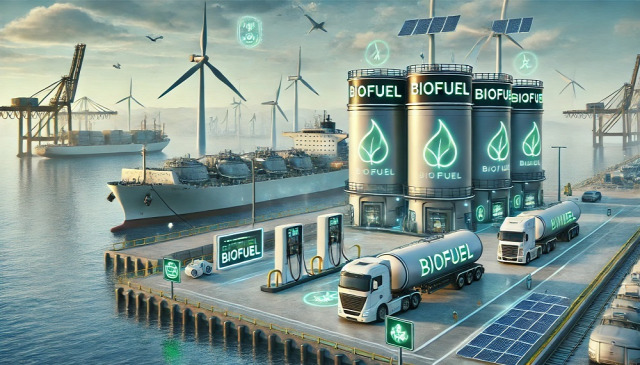
The Europe Marine Biofuel Market is gaining significant momentum as the maritime industry seeks sustainable alternatives to traditional fossil fuels. With stringent regulations on carbon emissions and increasing pressure to decarbonize shipping operations, marine biofuels are emerging as a viable solution to reduce the sector’s environmental footprint.
According to BISResearch, the Europe marine biofuel market was valued at $1,417.6 million in 2023 and is expected to reach $4,515.9 million by 2033 at a CAGR of 12.28% from 2023 to 2033.
Europe’s Leadership in Marine Biofuels: Driving Innovation and Sustainability
Countries like the Netherlands, Denmark, and Norway are at the forefront of marine biofuel adoption, investing heavily in R&D to enhance production, efficiency, and performance. Collaboration between governments, research institutions, and private firms is driving advancements in biofuel infrastructure and supply chains. The IMO’s 2020 sulfur cap has accelerated the shift to cleaner fuels, with marine biofuels aiding compliance and reducing shipping emissions. This market is set for continued growth, supporting Europe’s transition to a greener maritime industry.
What is the future of biofuels?
The future of biofuels is promising, with advancements in technology improving efficiency and reducing costs. As global focus on sustainability grows, biofuels are expected to play a crucial role in reducing greenhouse gas emissions, especially in transportation and industry, supporting the transition to a more sustainable energy landscape.
Request A Detailed Sample on the Europe Marine Biofuel Market!
Challenges in the Europe Marine Biofuel Market
- High Production Costs: Biofuels remain more expensive than conventional marine fuels.
- Feedstock Availability: Scaling up biofuel production requires a reliable and sustainable supply of feedstocks.
- Infrastructure Limitations: Ports need upgraded storage and refueling facilities for marine biofuels.
- Competition from Alternative Fuels: LNG, ammonia, and hydrogen are also gaining traction as alternative maritime fuels.
Future Outlook and Opportunities
- Scaling Up Production: Investments in advanced bio-refineries can improve cost efficiency.
- Policy Support & Incentives: Stronger government subsidies and carbon pricing mechanisms can boost adoption.
- Strategic Partnerships: Collaborations between shipping companies, fuel producers, and policymakers will drive market expansion.
- Technological Innovations: Advances in synthetic biofuels and carbon capture integration could further enhance biofuel viability.
Some of the prominent companies in this market are:
- A.P. Moller - Maersk
- BP plc
- Cepsa
- GoodFuels
- Neste
- TotalEnergies SE
- Uniper SE
Conclusion
The Europe Marine Biofuel Market is at a crucial turning point, with regulations, technological advancements, and corporate commitments shaping its growth. While challenges such as cost and infrastructure remain, increasing investments and supportive policies will accelerate biofuel adoption in the maritime sector. As Europe aims for a greener shipping industry, marine biofuels are set to play a pivotal role in reducing carbon emissions and driving sustainable marine transportation.

